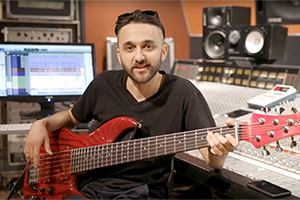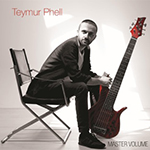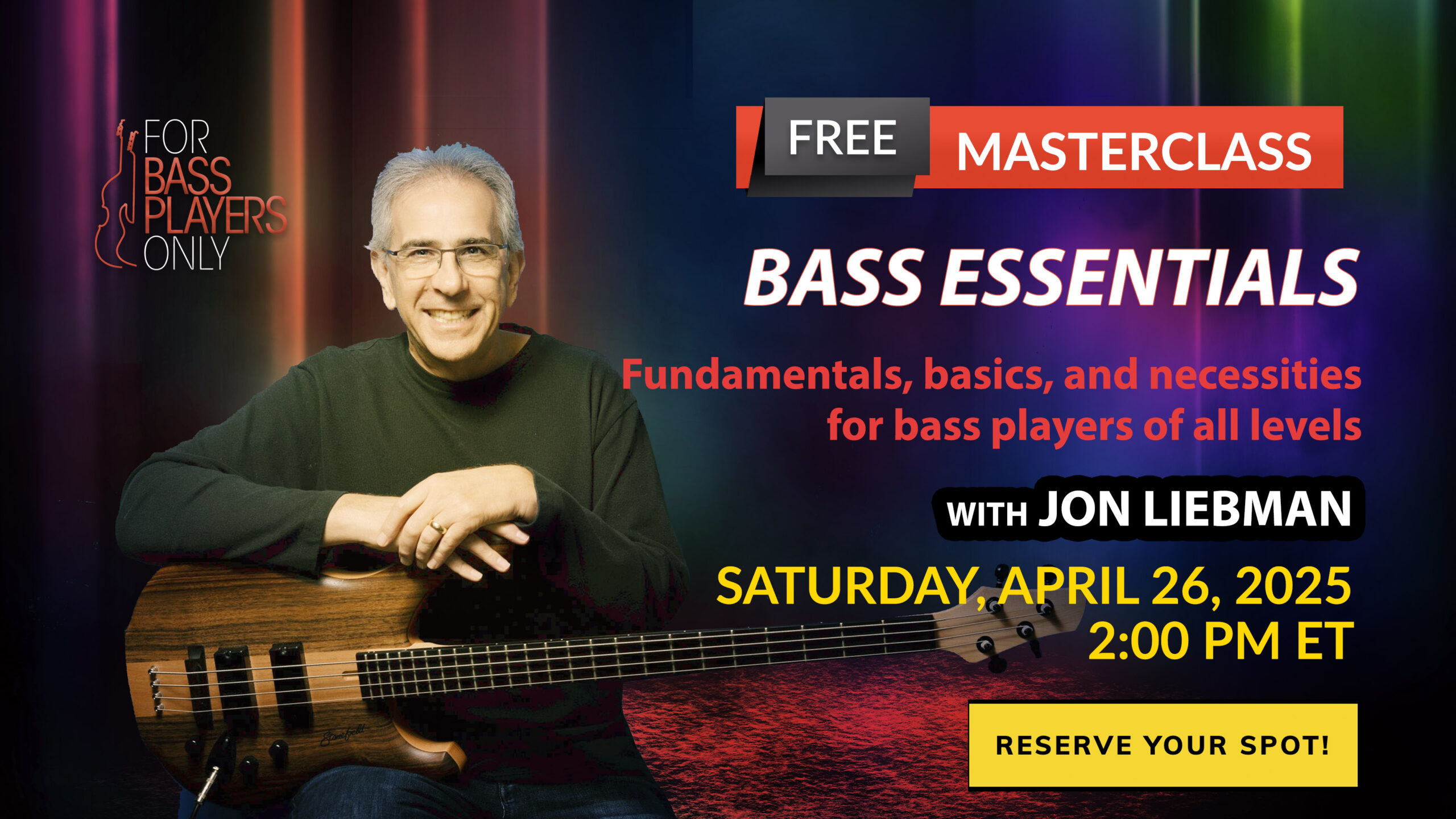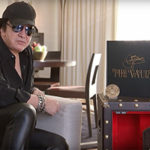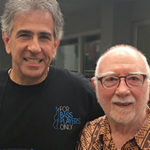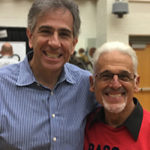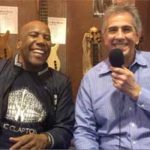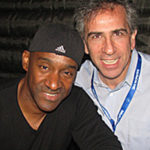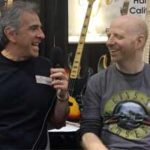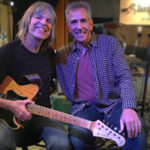Azerbaijani doubler talks new record, and the “right” way to play jazz
Exclusive interview with FBPO’s Jon Liebman
December 23, 2019
The product of a musical family, Teymur Phell was born in Azerbaijan in 1987, and immigrated to Israel with his family in 1991. After graduating from the WIZO high school for the arts in Haifa, Teymur enrolled at the Jerusalem Academy of Music, where he studied classical upright bass with professor Michael Klinghoffer. Shortly after graduating from the academy, Teymur moved to New York in 2011, where he soon became established in the New York music scene. As he became increasingly well known in New York he attained work as a sideman with Arturo Sandoval, Mike Stern, Leni Stern, Bill Evans, Randy Brecker, Simon Phillips, Oz Noy, Dennis Chambers, Leni White, Amal Murkus, Steve Smith and many others. Teymur’s debut solo record, Master Volume, was released in November of 2019, and features Mike Stern and Dennis Chambers, among many other A-list players. Master Volume is an all-original mixture of tunes, combining electric jazz, fusion, and funk, as well as influences from Azerbaijan and Israel.
FBPO: Let’s start from the beginning. Tell me about the early years.
Teymur: I was born in Azerbaijan, back when it was part of the Soviet Union, and then we moved to Israel in ’91, when I was three years old, and I grew up there.
FBPO: What took your family to Israel?
Teymur: Well, they were Jewish, so that was one thing [Laughs]. I guess my grandparents, they always had the dream of going to Israel, The Promised Land, whatever, and they opened the gates. They had a chance to get out, and they took it.
FBPO: You went to high school in Haifa. Was there a big shrine to Gene Simmons there?
Teymur: Uh, no.
FBPO: He’s from Haifa too, you know. His real name is Chaim Witz.
Teymur: I didn’t know that. It’s not like I’m a big fan or anything. [Laughs]
FBPO: Tell me about your initial exposure to music. What attracted you to the bass?
Teymur: Well, my dad is a musician. He’s a composer, he’s a piano player and an arranger. My grandmother was a classical piano player. She studied music with Shostakovich in Moscow in the ’50s. So it was definitely a musical house. Usually when you think about Russia or a Soviet family, they show a violin to a kid, you know, like a three-year-old. There was none of that. I was just a regular kid. (My family) knew what it is to be a musician, (and) they never wanted it for me, so nobody ever really forced me or told me to practice music or any of that. And then, pretty much at age 13, I started playing bass. I was watching MTV, like every other kid I guess at the time, and my dad was walking through the room and he just spit out, “Oh, that’s a nice bass line.” And I’m like, “What? What’s a bass line?” That’s how it started. He rented me a Fender Squire from the local music store for a few months, and I was playing it in no time.
FBPO: Did you pick it up on your own, or did you study formally?
Teymur: I never really had a bass teacher. My dad was just kind of showing me music, and I would figure out the technique I guess, kind of on my own. He got me videocassettes, a couple books, you know, (and I) just started there. And then about a year, year-and-a-half after I started playing, I went and auditioned (at) the arts high school, WIZO, and they accepted me. I had natural talent, I had an ability to sit down and practice. I was getting quite serious about it fast, and that was it.
FBPO: Do you remember what video was playing when your father happened to walk through the room?
Teymur: Yeah, I think it was a singer, Anastacia. I think she was popular back then. It was like 2001, 2002, something like that.
FBPO: I did an interview a few years ago with Michael Klinghoffer. I understand you studied with him.
Teymur: Yes, that’s correct.
FBPO: I assume that was on the upright bass? Classical, with the bow?
Teymur: When I went to college, I didn’t really see an electric bass teacher that I liked or wanted to study with. I was 18 years old and I knew what I had to practice. I knew what I had to do and I was just doing it, so I didn’t really feel like I needed a bass guitar instructor. They didn’t have a jazz upright teacher either. The only guy they had was classical, Michael Klinghoffer, so I said, all right, I’m gonna go to him, study the bow, and learn the upright properly, from zero. When I came to him, he said, “Okay, pull out the bow, play me something.” I just said, “I can’t. I never played anything with a bow before.” And he started me with “Twinkle, Twinkle, Little Star,” basically, at age 18, first lesson. And then, very quickly, I got very serious about that too. (I) started playing all the etudes, all the exercises, scales and arpeggios for hours a day. (I) kind of abandoned the electric bass even, for maybe six months or a year, just focusing on that, because I just hated not being good at that. My first year of college, I was in the jazz department, and then at the end of that year, I auditioned for second year classical, and I got accepted. I switched to the classical program and, for the rest of my degree, studied with Michael and played in the orchestra, basically playing classical the whole time.
FBPO: Did he start you on French bow or German bow?
Teymur: He started me on German bow.
FBPO: You mentioned etudes, so Simandl I’m guessing?
Teymur: We did Simandl, we did Edouard Nanny later on. We did Rabbath. Rabbath was great. So, Simandl, Rabbath, Dragonetti, Nanny later on. I still play Nanny sometimes now.
FBPO: I interviewed François Rabbath a few years ago.
Teymur: Was he wearing a gold chain? [Laughs]
FBPO: He might have been! You can watch the video. It’s on For Bass Players Only.
Teymur: He’s a nice guy.
FBPO: He’s very nice! And you know what, on that very same exact day that I interviewed Francois Rabbath, I interviewed Gary Karr.
Teymur: Cool!
FBPO: Who were your influences on the bass? Did you find yourself picking out the bass when you listened to the radio, records, TV, MTV?
Teymur: Absolutely! Like the first day, when my dad got me that Squire, and then he left for work. He said, “Look, these are the E, A, D, G strings. Right hand plucks it, and (with) the left hand you choose the notes. So just try to play open strings, and he showed me like half a major scale or something, and he left for work. When he got back – from actually teaching music all day – when he came back home that night, I was playing along with Will Smith, “Gettin’ Jiggy Wit It,” ‘cause that’s just, you know, a CD that I had that I liked. So I was just playing along with that bass line really quickly, and kind of tapping my foot. And when he saw me do that, he said, “All right, we’re in trouble.” [Laughs]
FBPO: Still no formal training, though?
Teymur: He kind of refused, for some reason. I was begging for bass lessons. I don’t know if he wanted to save money, or he thought it was not necessary. I don’t know the reason. I should ask him. He got me the John Patitucci electric bass instructional videocassette. That really helped ‘cause there (were) a lot of helpful exercises there. He got me the Jaco Pastorius stuff, specifically, maybe things he didn’t have at home. But from stuff that he had at home, he had a lot of Oscar Peterson and Ray Brown, so I was listening a lot to Ray Brown. He had some Ron Carter stuff in there. He had the Brecker Brothers, he had Bob James, which was the first place I heard Nathan East playing his great bass lines, this album called Grand Piano Canyon. That was a big influence, that album, Grand Piano Canyon because Nathan East, I think, was at his best on that record. So just listening to pretty much everything he had at home. He had other stuff, like Manhattan Transfer, he had Barry White. He had a bunch of things, so I was pretty much listening to whatever he had, Steps Ahead, Miles Davis, you know, whatever. All of it. And then I was getting more into bass players. I was checking out stuff like Marcus Miller and Anthony Jackson, you know, those Michel Camilo records. He made sure we had a lot of music to listen to all the time, and play along.
FBPO: How much work were you doing in Israel, before you moved to New York?
Teymur: I was playing professionally since age 15. I was teaching since I was 15 also. And then at 18, I started teaching at a school, guys that were like two years younger than me sometimes. Sometimes guys were like four years older. I used to teach them when I was 18 also. And I toured with this Palestinian singer named Amal Murkus. My dad was also in that band, so he kind of got me that gig. We went all over the world. We went to Europe, we went to Asia, New Zealand, so that was a great experience.
FBPO: And you were how old at the time?
Teymur: I want to say 19, 20, 21, something like that.
FBPO: What about making the move to New York? Did you have anything lined up, or did you decide to just go for it?
Teymur: I wanted to finish my classical studies, you know, finish the degree, and then kind of jump back to jazz and the other stuff. I always knew I would move to New York at some point, somehow, so I was trying to work a little bit, save a little bit of money to do it. I applied to the City College of New York for a master’s degree because, also, John Patitucci was teaching there and I wanted to study with him. I did the whole application, I felt my audition was really good, but they denied it. I got an email and they said no. I was really upset ‘cause I felt like I deserved it, but they said no. So my dad said, “Maybe you should wait and apply again next year,” and I said, “Fuck it.” I said, “I’m going. I’m going.” I needed a student visa from City College of New York, to come here, and I ended up just coming on a tourist visa. Then I figured out ways to stay here. One thing led to another. Later on, actually, I got to study with John Patitucci privately, at his house. He liked me as a student. He really likes the bow too, and the classical stuff. I was able to play some of that, so he was impressed with that.
FBPO: So how did your career get rolling in New York?
Teymur: As soon as I got here, you know, you ask what do you do, and everybody said you gotta start going out to the jam sessions. Just get (to) know people. Getting to know the city, getting to know the scene. And that’s what I started doing. I went to Smalls, to a jam session, I think like three or four days after I got here, and then I got a gig right away. I was playing somebody else’s upright, just playing a couple standards, and he came to me and said, you know, this gig pays like 75 bucks, plus dinner. I was like, yeah, sure. I’ll take anything. I kept doing some of that, meeting people, playing, going to jam sessions, getting some more gigs. I also started going to the 55 Bar a lot because one of the people I grew up listening to, and always was a fan of, was Mike Stern.
FBPO: I was waiting for Mike’s name to come up when you mentioned the 55 Bar!
Teymur: Yeah, so I couldn’t believe that, you know, he’s playing this little dive bar.
FBPO: I’ve seen him there, with Jeff Andrews and Adam Nussbaum, many years ago.
Teymur: Yeah, that was back, a long time ago. I basically started coming there and bargained (with) him to play. I was a fan. I think we’d sound good together. I mean, I had nothing to lose, you understand? I’m sitting here with a tourist visa that’s about to expire in a couple months. I got nothing to lose, so I was just like going every week, every Monday and Wednesday. Richard Bona was playing with him, Anthony Jackson was playing with him. And I kinda felt that I could do it, you know, not out of a cocky place, but just, I felt I would sound good in that band. Does that make sense?
FBPO: Sure!
Teymur: So yeah, eventually he gave me a shot. He said come over to my house and let’s jam. And, you know, the rest is history.
FBPO: Let’s talk about the new record, Master Volume. Congratulations, first of all. What a great work!
Teymur: Thank you very much.
FBPO: It’s got quite a variety of feels. What did you want to say through this record?
Teymur: Well, this is the record I always wanted to do. I mean this is the record where I wanted to play both the jazz and the funky stuff that I acquired since moving to New York. Also some of the traditional music that’s in my DNA. I wanted to put everything I have together in this record and just put it all together. That was the idea.
FBPO: You don’t waste any time getting to the serious bass chops, right from the very, very beginning of the record, on “Zero to Sixty.”
Teymur: Yeah, I’ll tell you why. I remember when my dad got me the Jaco Pastorius album. As soon as you hit “play” on that thing, it’s like this big, giant wave is drawing you in. Immediately, you’re in it, instantly. I kind of wanted that same feeling with my album. As soon as you play that first track, I wanted it to draw you in. And I called it “Zero to Sixty.”
FBPO: There’s some beautiful guitar playing throughout the record too. I’d know Mike Stern a mile away!
Teymur: Yeah, well he’s on two tracks. He’s on track number 2, called “Papano Kimono,” which, it’s a funny name, Papano Kimono, a southeastern European language. I can’t remember where I heard it, but it means “pimp’s jacket.” I just liked it and it kind of felt like the right title, so I used it. He’s on that, and he’s on “Unfinished Business,” as well.
FBPO: I like that one too. It’s kind of jaunty.
Teymur: I had a different name (and) I changed it to “Unfinished Business” because Mike and I actually stopped playing a year ago, after like I think eight years. We kind of took a break, and I felt like we had a little bit of unfinished business there, so I thought that’s a perfect title for that tune.
FBPO: There’s some beautiful fretless on the record too, on “Old Window.”
Teymur: “Old Window” is a glance into where my family’s coming from in Azerbaijan. It just grows into that world, this meditational kind of state, for a quick minute. That’s exactly what it was. The fretless is also on a tune called “Sweet Sweep.”
FBPO: I like that one too. I like it all.
Teymur: Thank you.
FBPO: There are some nice horn arrangements throughout, and the vocals really enhance the songs that they’re on. Did you do any of the vocals?
Teymur: Yeah, it’s all me on the vocals, actually.
FBPO: And you wrote all the tunes too, right?
Teymur: I wrote all the tunes, I arranged all the tunes. My dad helped with the arrangement on “Worth the Wait,” with all the horns, because that’s what he does. He’s basically a big band arranger. That’s his bread and butter. So when I did those arrangements, I sent it to him, I said take a look, and what do you think? He suggested some cool stuff like that second flute line. He wrote that in, and some of the other stuff, so we did that together. That was actually cool to have my dad be a part of the record in that way.
FBPO: What does “Hayvanhana” mean?
Teymur: It’s an Azerbaijani word. It basically means, not a zoo, but like an animal course, like if you have the horses with the cows, everybody together just kind of feeding and eating. So the area’s called heyvanhana.
FBPO: I like the double stops and the muted thumb plucking on that song.
Teymur: Yeah, it came from the 9/8 groove that I started playing on the bass. I liked it and then I was trying to be sneaky about it, you know? [Laughs]
FBPO: What about “Blues for Who?” Did you have somebody in mind when you wrote that?
Teymur: There’s a guitar player I used to play with in New York in my first years here, and on the way to a gig, he texted me and said we ought to play something new, you know, kind of bored, maybe play a new blues. And I said, okay, or maybe I’ll come up with something. And on the way to the gig, I wrote it, literally, on the train, on a piece of paper. And we fucked it up that night, you know, we didn’t play it well. And then for years after that, it was named for him, ‘cause he asked for a new tune so it was “Blues For…” I don’t want to say his name, but for this guy. And years, and years, and years after, he (still) never learned it, so every time we wanted to play it, he didn’t have it, right? Eventually I said, “If you’re not going to learn this blues, I’m going to take your name out of the title. He never learned it, so I took his name out of the title. [Laughs]
FBPO: Are you doing go be doing any touring to promote the record?
Teymur: Yeah, working on it. Definitely working on it now. Setting everything in motion. So, absolutely working on a summer tour now.
FBPO: Is there anything else about the record you’d like to share?
Teymur: There’s one other thing I want to say about this record. And you can quote me on this if you want. A lot of people today, and it was very popular in the last couple years, are doing GoFundMe and Kickstarter, and all these things to fund the record. They send you private messages sometimes, over Facebook, social media, even to your phone, “I want to do this record,” you know, “Donate the money, blah, blah, blah.” “Pre-order the record before we make it” kind of thing. And I never believed in that. I never believed that (if) somebody wants to do a record, and now they go out and they ask for money to do it, basically that way (they’re) covered, because even if the record is not good, you already had people pay for it. So, worst-case, you’re safe because it’s paid for. And I never wanted to do my record like that because I paid for my record entirely. It’s very expensive, as you know, to do a good-sounding record, so I never wanted to go out and ask for money to do it. I’m going to put out the money, and if it’s good, hopefully you’ll pay $9.99 and support me that way. And I’m still getting messages from people, “I’m doing a record. If you can send fifteen dollars, ten dollars to support it…” And I’m like, how about this? “I paid for my record, you pay for your record, and if it’s good, I’ll buy your record, and if mine’s good, you’ll buy mine.” A lot of people can’t afford to do a record, and sometimes, if you can’t afford it, maybe you’re not supposed to do it. I know it sounds harsh, but if you can’t afford to do it at this point, maybe you shouldn’t be doing it. Or you can go to a bank, or you can go to your parents. I’m really against the whole Kickstarter, GoFundMe thing. I can’t see it. It’s not for me, so for that reason, my record is not available for streaming, at all. It’s only available for purchase because if somebody else would have paid for my record, I would have been, “Okay, stream it, do whatever you want.” I have to make my investment back and besides everything else that went into doing the record, just the money part, that’s why it’s not available for streaming, and I’ll appreciate anyone who can consider even buying the first tune for ninety-nine cents, and if you like it, maybe the rest of the record. That’d be great.
FBPO: Tell me about your gear.
Teymur: I use DR strings. I’ve been using them for many years. They were my first endorsement. They’re the best. I use MarkBass amps. MarkBass, from Italy. Very good company. Great-sounding gear. My basses are F Bass, from Ontario, Canada. I have a six-string fretted from them. I have a few basses we’re working on, perfecting the model. We actually built three basses. We’re doing a signature model coming up next year, so that’s very exciting. I use Asterope Cables, these guys out of Texas. Very good, high-end cables. I also have an endorsement with BOSS pedals. I definitely like those, the tuners, the reverb. I use them all the time. That’s pretty much it.
FBPO: Are you primarily a 5-string player? 6-string player? Are you still playing a lot of 4? What’s your main number of strings?
Teymur: It depends on the gig. On the fretless, I like a 5-string. I definitely like that low string for recordings. I’ve been playing a 6-string since I was 17, 18 years old. A lot of times (when) people hear you play a 6-string, they automatically think you’re just going to solo up top and sound like a guitar, it’s not gonna be any bass. And it’s not the case with me. You heard the record, there’s a lot of low end, it’s not all about playing up there. Also, I used to transcribe a lot of solos, and I hated to jump octaves. Hated it! I was transcribing a Michael Brecker solo, for example, and I didn’t have the range on a 4-string, or a 5-string. I wanted to be able to play the solos like the horns, like the piano. I wanted that range, so I think that’s where it came from, transcribing solos, and I wanted to have the range.
FBPO: Now I know why you’re such a fan of Patitucci, and Anthony Jackson!
Teymur: When I first came here, I used to see (Anthony) play with Stern at the 55 Bar. Then, maybe five, six years later, I was playing there with Mike, and Anthony was sitting right in front of us, first set, and I’m, “Oh, man!” Nerves as hell. Anthony’s gonna to listen to every fuckin’ note I’m gonna play. And then, at the end, I came up to him and said hi, what’s goin’ on. I said, “What do you think?” And he paused for, like, 35, 45 seconds to actually think about what I asked him. He didn’t just shoot out an answer. And then he said, “Don’t change anything.” [Laughs] And I was like, all right, so happy!
FBPO: You’ve been pretty outspoken about music technique, particularly when it comes to walking or applying jazz concepts on the electric bass.
Teymur: Yeah, well if you live in New York, if you walk into a club, like Smalls, or whatever, and you have an electric bass, they’re going to give you “stink eye.” That’s just how it is. They say you can’t swing (on) electric bass, and all that stuff. If you hear Marcus Miller on a record called Dreyfus Night in Paris, with Michel Petrucciani, or listen to Anthony Jackson, or Jaco Pastorius, if you can get the feel, it doesn’t matter what instrument you play. Sometimes I even prefer electric bass with a piano trio. The same thing with a 6-string. If they see a 6-string bass, forget it! You can’t fuckin’ swing on that thing! You can’t play jazz on that thing. Just because you’re not aware of it doesn’t mean you can’t do it. So that’s why I take it kind of personally.
FBPO: Are you referring to the cliché-type things people tend to overdo on the electric when it comes to playing jazz?
Teymur: On electric bass, a lot of people, when they try to walk or just play jazz, they’re going to add a lot of triplets, a lot of ornaments, a lot of stuff right away, all that bullshit on top. That’s what turns jazz lovers off to electric bass. I always recommend playing fat quarter notes. If you can just play fat quarter notes, and just see how satisfying that can be on an electric bass. If you can get a good tone out, like for example, if you’re playing like a jazz bass-style instrument, I usually go towards the back pickup, towards the bridge pickup more, and turn the neck pickup a little off, and with my right hand I will play, let’s say, over the fretboard or where the fretboard meets the body of the bass or something, so you get a fat, uprighty tone. It’s about the tone and the time; it’s not about what instrument you play. You can play an upright bass with a weird time and a weird tone, that’s not going to sound good, so what’s the difference, you know?
FBPO: What would you be if you weren’t a bass player?
Teymur: I’m a really good salesman. I’d probably be into some kind of sales. Or a chef, or a 9-ball pool player. I practice pool probably five, six hours a week, at least. It’s cheaper than a therapist!
See Jon’s blog, with key takeaways from this interview, here.
Master Volume is available here:
